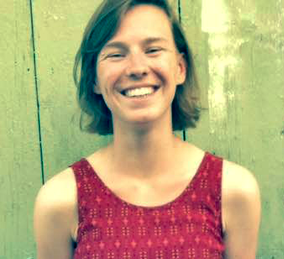Sarah Hickman

Inquisitive, eager and enthusiastic, those are some of the words PhD student and clinical research associate Sarah Hickman uses when describing herself working in research.
Sarah is one of the latest students in Cambridge who has decided to make health research her career. With a wide variety of options to specialise in, Sarah has decided to focus on radiology – medical imaging devices to help diagnose and treat diseases within the body.
Discovering radiology
Sarah’s journey into radiology began when she took part in the NHS Academic Foundation Programme (AFP) with Professor Fiona J Gilbert. The four month rotation provided Sarah with a taste of what the world of radiology can offer and how it can be used for patient care, and therefore she decided to explore it further. So much so, Sarah started her PhD at the University of Cambridge, with the Department of Radiology, last September.
“After completing my AFP, I knew radiology was for me. I saw first-hand the interesting work that came from imaging and was keen to continue working on in this area. I am now part of a large research team working with lots of people on a number of exciting multi-centre trials.”
At this early stage in her research career Sarah is already busy running her own research with the help of an experienced team. “My research focuses on testing and evaluating Artificial Intelligence (AI) algorithms in breast imaging, and looking at how AI can improve breast screening for patients which in turn will help improve their care.”
Doctor to researcher
Sarah is no stranger to healthcare, she qualified as a doctor before moving into research and clearly still has the patient’s interests at heart. “As a junior doctor, I was fascinated in the latest technologies, how they worked and their adoption into clinical practice. However, I wanted to find a way where I could improve patient care by combining my passion for healthcare with technology, and that’s when I looked at research as a career.
“I found radiology provided the best of both worlds, it’s an amazing speciality to be a part of as the technology is developing all the time. We get to use the latest imaging devices to help improve our knowledge of how the body and diseases work and ultimately still help patients.”
Is there any difference from being a doctor to a researcher?
“In both these fields my priority is always putting the patient first and making sure you provide the best care for them. I found research rewarding because that’s where we can provide the evidence to make the changes to how we treat people in the future.”
And how important is it for more women enter the science field?
“More women are needed in science and in medicine. The population we serve is diverse and therefore it is important that the workforce is equally diverse.”
“Working in research has been a steep learning curve with no two days being the same. I’m learning new techniques all the time and there is a large demand to be up to date with the latest research and protocols. With the hard work comes the many exciting opportunities to explore.”


